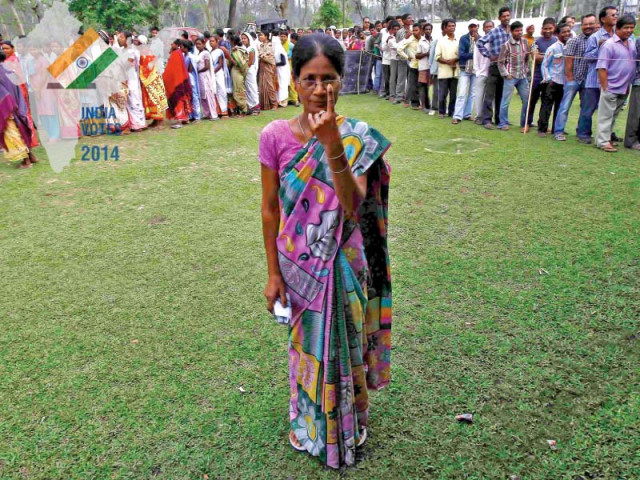India tea workers buck trend, stick with Congress
Loyalty to one’s own tribe or community often trumps all other considerations.

A woman shows her ink-marked finger after casting her vote in Assam. PHOTO: REUTERS
Retired tea worker Vilati Tati has a strong brew of complaints about the Congress government and queuing at the start of India’s election required a Herculean effort for the 70-year-old.
But after a lifetime working on plantations in India’s famed northeastern Assam tea district, Tati said she had no qualms about still voting for the ruling party even though it faces electoral humiliation elsewhere.
“I voted for the hand,” she said of the political symbol of India’s historic party of government which is still dominant in Assam.
“Garden workers have always voted for Congress.”
Rabin Bhumij, a supervisor at the 745-hectare Bokel plantation near the city of Dibrugarh, also struggles to make ends meet with a salary of just Indian Rs5,000 a month ($83) which is supplemented by rations of wheat, rice and firewood.
“Our salaries continue to be low, we do not get enough rations and our electricity bill is too high,” Bhumij told AFP when asked about his biggest problems.
Yet despite all this, he will vote again for local MP Paban Singh Ghatowar, who is a low-profile government minister for development in India’s northeast.
“Nothing has changed during Ghatowar’s five terms here,” said Bhumij.
But the politician is also crucially a former union leader for tea workers and thus Bhumij will stick with one of his own.
“We are proud that one of us has made it to the parliament,” he added.
And with tea workers representing more than a quarter of the 1.1 million-strong electorate of Dibrugarh, this support, however begrudgingly offered, is a huge advantage for Ghatowar as he seeks a sixth term.
It illustrates one of Indian democracy’s enduring features: that loyalty to one’s own tribe or community often trumps all other considerations, even when a law-maker is considered inept.
Speaking to AFP, Ghatowar insisted that the tea workers of Assam fared better than those in other parts of the country..
“Every industry has its own grievances. If we compare the tea plantation workers in Assam and West Bengal, the Assam tea workers are much better off,” he said.
Published in The Express Tribune, April 8th, 2014.


















COMMENTS
Comments are moderated and generally will be posted if they are on-topic and not abusive.
For more information, please see our Comments FAQ